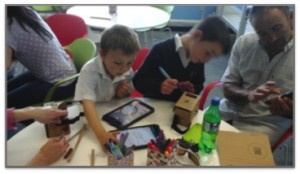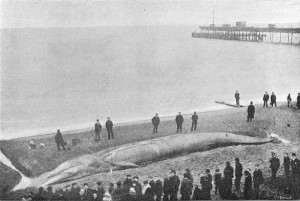After a cracking start to 2016 in January, the Knowledge Exchange and Impact Team (KEIT) within RKEO have been working hard and continuing with the successes this month.
Public Engagement
The Festival of Learning is fast approaching us (25-29 June) and Naomi and Katie have been busy scheduling in the events that will make up the festival.
Business Engagement
Rising to the challenge of “What will Marty McFly may need in 25 years?” as part of interdisciplinary research week held in January, members of KEIT worked closely with the facilitators to deliver a successful sandpit that involved a number of local businesses including Bournemouth Borough Council, We Are Base, LV= and Barclays Digital eagles. With some great ideas evolving in terms of future collaborations amongst academics and business partners this provided a great networking opportunity for those that attended.
As the current HEIF funding round completes its half way milestone of 12 months funding (1/8/15 – 31/7/16), a number of the 13 projects are beginning to generate potential impact case studies alongside further UK and EU funding proposals. HEIF projects continue to feature in the news with Dr Sarah Bate’s research on super recognisers being published in Scientific American being one of the latest. HEIF projects are also gaining presence on BU’s research website with a project on Roman Britain being the first to go live with more planned.
For the March submission date, we have two potential KTPs. Both SciTech and the Faculty of Media are working towards each submission, respectively.
NEW – Student Project Bank
We have a new recruit this week within KEIT. Charlene Steele has joined us from SciTech specifically to work on the new Student Project Bank initiative. If your students work with organisations as part of the modules they take, please do contact Charlene to find out more about this initiative and how we can help.
Student Engagement with Research
The student engagement page is now live on the Research website, it can be found here. It explains all student facing research activities from the Research Spotlight feature to 14: Live the monthly research talk.
Research Communications
New research project pages are now avaliable on the research website and are a great place for academics to add content about their latest research projects e.g. staff lists, project background and latest news.
Team KEIT (RKEO)
If you’re feeling inspired by this blog post and would like to get involved with some of our projects then feel free to get in touch:
Genna West – Knowledge Exchange and Impact Manager
Rachel Bowen – Research Communications Manager
Rachel Clarke – Knowledge Exchange Adviser (KTP)
Jayne Codling – Knowledge Exchange Adviser
Naomi Kay – Public Engagement Officer
Charlene Steele – Project Co-Ordinator (Student Project Bank)
Katie Breadmore – Public Engagement Event’s Organiser
Oliver Cooke – Student Engagement Coordinator
To find out more about us and what we do, take a look at our team page.


![InnovateUK_LogoA_Interim_RGBx320govuk[1]](http://blogs.bournemouth.ac.uk/research/files/2014/12/InnovateUK_LogoA_Interim_RGBx320govuk11-300x90.jpg)

![InnovateUK_LogoA_Interim_RGBx320govuk[1]](http://blogs.bournemouth.ac.uk/research/files/2014/12/InnovateUK_LogoA_Interim_RGBx320govuk1-300x90.jpg)


















 Beyond Academia: Exploring Career Options for Early Career Researchers – Online Workshop
Beyond Academia: Exploring Career Options for Early Career Researchers – Online Workshop UKCGE Recognised Research Supervision Programme: Deadline Approaching
UKCGE Recognised Research Supervision Programme: Deadline Approaching SPROUT: From Sustainable Research to Sustainable Research Lives
SPROUT: From Sustainable Research to Sustainable Research Lives BRIAN upgrade and new look
BRIAN upgrade and new look Seeing the fruits of your labour in Bangladesh
Seeing the fruits of your labour in Bangladesh ECR Funding Open Call: Research Culture & Community Grant – Apply now
ECR Funding Open Call: Research Culture & Community Grant – Apply now ECR Funding Open Call: Research Culture & Community Grant – Application Deadline Friday 12 December
ECR Funding Open Call: Research Culture & Community Grant – Application Deadline Friday 12 December MSCA Postdoctoral Fellowships 2025 Call
MSCA Postdoctoral Fellowships 2025 Call ERC Advanced Grant 2025 Webinar
ERC Advanced Grant 2025 Webinar Update on UKRO services
Update on UKRO services European research project exploring use of ‘virtual twins’ to better manage metabolic associated fatty liver disease
European research project exploring use of ‘virtual twins’ to better manage metabolic associated fatty liver disease